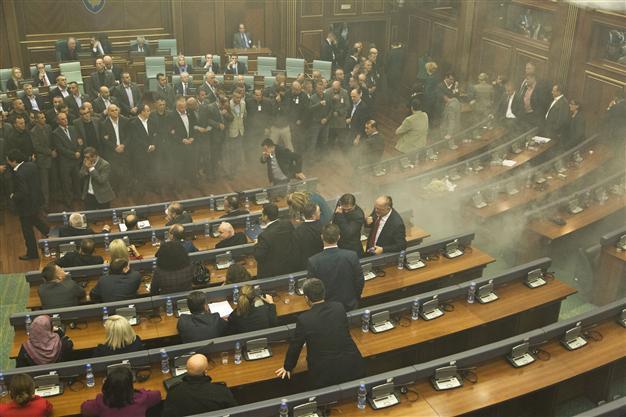Kosovo signs stabilization and association agreement with EU
PRISTINA, Kosovo - The Associated Press

Smoke covers the chamber of parliament as opposition lawmakers disrupt Parliament's session using tear gas, in Pristina, Kosovo, Friday, Oct. 23, 2015. Kosovo's Parliament on Friday suspended its session for the second time in a day when opposition lawmakers protesting the government's agreements with Serbia and Montenegro threw tear gas canisters in the chamber. (AP Photo/Visar Kryeziu)
Kosovo on Oct. 27 signed a stabilization and association agreement with the European Union, a milestone expected to promote economic growth in one of Europe's poorest countries.
The Oct. 27 signature in Strasbourg, France, done at EU foreign policy chief Federica Mogherini's office there, opens the way to eventual full membership in the EU, Kosovo's main trading partner.
Mogherini described the signature as a "very important step that has implied a lot, a lot, of work on both sides."
"Now it is about implementation," said EU enlargement commissioner Johannes Hahn, who will visit Kosovo next week.
Kosovo Prime Minister Isa Mustafa hoped the next step would be visa liberalization. Kosovo is the only country in the region not enjoying a visa-free regime with EU countries.
"Today we are entering into contractual arrangements with the European Union, which is a very important process for us," Mustafa said. "We will do everything to justify this very important step that we are taking."
Bekim Collaku, Kosovo's minister for European integration, hailed the agreement.
"We want to become members of the European family in terms of economic integration but also to share the EU values," Collaku told The Associated Press on Oct. 26.
The EU has been Kosovo's main supporter with about 1.3 billion euros (some $1.4 billion) in development aid for 2007-2020, according to Thomas Gnocchi of the EU office in Kosovo.
He said the requirements of the agreement should make Kosovo a more legally certain place to do business and encourage foreign investors.
In 2014, EU countries were the main trading partner for Kosovo with 30.2 percent of its exports and 42.6 percent of imports, in total 1.2 billion euros (about $1.3 billion). Exports, however, represented less than 10 percent of that figure.
The agreement will allow local companies to export to EU countries without customs tariffs, making their goods more competitive.
Kosovo declared independence from Serbia in 2008 and has been recognized by more than 100 countries. Five EU member countries that do not recognize it have, nevertheless, approved the agreement.
Collaku thanked all EU countries, including those not recognizing Kosovo, "that have understood the only way to strengthen peace, stability and cooperation in the western Balkans is by opening the doors to the remaining western Balkans to join the EU."
